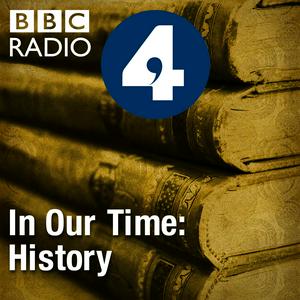Plutarch's Parallel Lives
Melvyn Bragg and guests discuss the Greek biographer Plutarch (c46 AD-c120 AD) and especially his work 'Parallel Lives' which has shaped the way successive generations see the Classical world. Plutarch was clear that he was writing lives, not histories, and he wrote these very focussed accounts in pairs to contrast and compare the characters of famous Greeks and Romans, side by side, along with their virtues and vices. This focus on the inner lives of great men was to fascinate Shakespeare, who drew on Plutarch considerably when writing his Julius Caesar, Coriolanus, Timon of Athens and Antony and Cleopatra. While few followed his approach of setting lives in pairs, Plutarch's work was to influence countless biographers especially from the Enlightenment onwards.WithJudith Mossman
Professor Emerita of Classics at Coventry UniversityAndrew Erskine
Professor of Ancient History at the University of EdinburghAnd Paul Cartledge
AG Leventis Senior Research Fellow of Clare College, University of CambridgeProducer: Simon TillotsonReading list:Mark Beck (ed.), A Companion to Plutarch (Wiley-Blackwell, 2014)Colin Burrow, Shakespeare and Classical Antiquity (Oxford University Press, 2013), especially chapter 6Raphaëla Dubreuil, Theater and Politics in Plutarch’s Parallel Lives (Brill, 2023)Tim Duff, Plutarch’s Lives: Exploring Virtue and Vice (Oxford University Press, 1999)Noreen Humble (ed.), Plutarch’s Lives: Parallelism and Purpose (Classical Press of Wales, 2010)Robert Lamberton, Plutarch (Yale University Press, 2002)Hugh Liebert, Plutarch's Politics: Between City and Empire (Cambridge University Press, 2016)Christopher Pelling, Plutarch and History (Classical Press of Wales, 2002)Plutarch (trans. Robin Waterfield), Greek Lives (Oxford University Press, 2008) Plutarch (trans. Robin Waterfield), Roman Lives (Oxford University Press, 2008) Plutarch (trans. Robin Waterfield), Hellenistic Lives (Oxford University Press, 2016)Plutarch (trans. Ian Scott-Kilvert), The Rise and Fall of Athens: Nine Greek Lives (Penguin, 2023) Plutarch (trans. Ian Scott-Kilvert), The Age of Alexander: Nine Greek Lives (Penguin, 2011) Plutarch (trans. Richard Talbert), On Sparta (Penguin, 2005)Plutarch (trans. Christopher Pelling), The Rise of Rome (Penguin, 2013) Plutarch (trans. Christopher Pelling), Rome in Crisis: Nine Lives (Penguin, 2010)Plutarch (trans. Rex Warner), The Fall of the Roman Republic: Six Lives (Penguin, 2006)Plutarch (trans. Thomas North, ed. Judith Mossman), The Lives of the Noble Grecians and Romans (Wordsworth, 1998)Geert Roskam, Plutarch (Cambridge University Press, 2021)D. A. Russell, Plutarch (2nd ed., Bristol Classical Press, 2001)Philip A. Stadter, Plutarch and his Roman Readers (Oxford University Press, 2014)Frances B. Titchener and Alexei V. Zadorojnyi (eds.), The Cambridge Companion to Plutarch (Cambridge University Press, 2023)In Our Time is a BBC Studios Audio Production

